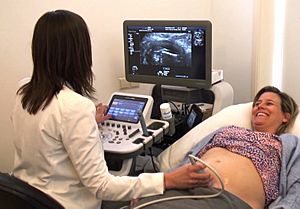Midwife facts for kids

A pregnant woman receives an ultrasound examination from a midwife sonographer
|
|
| Occupation | |
|---|---|
| Names | Midwife |
|
Occupation type
|
Professional |
|
Activity sectors
|
Midwifery, obstetrics, newborn care, women's health, reproductive health |
| Description | |
| Competencies | Knowledge, professional behaviour and specific skills in family planning, pregnancy, labour, birth, postpartum period, newborn care, women's health, reproductive health, and social, epidemiologic and cultural context of midwifery |
|
Education required
|
|
|
Fields of
employment |
hospitals, clinics, health units, maternity units, birth centers, private practices, home births, community, etc |
|
Related jobs
|
obstetrician, gynecologist, pediatrician |
A midwife is a healthcare professional. They are specially trained to help women during pregnancy, childbirth, and after the baby is born. Midwives also care for newborns. They focus on keeping both the mother and baby healthy.
Midwives are experts in normal pregnancies and births. They know how to spot if something is not quite right. They work to make sure every birth is as safe and positive as possible.
Contents
What Do Midwives Do?
Midwives offer a wide range of services. They are key helpers for new families.
Before the Baby Arrives
During pregnancy, midwives provide regular check-ups. They monitor the mother's health and the baby's growth. They also offer advice on healthy eating and lifestyle. Midwives help prepare parents for childbirth. They answer questions and ease any worries. They can also help with family planning.
During Childbirth
When it's time for the baby to be born, midwives are there. They support the mother through labor. They help manage pain and guide the mother during delivery. Midwives make sure the birth is safe for both mother and baby. They are trained to handle many situations that can happen during birth.
After the Baby is Born
After delivery, midwives continue to care for the family. They check on the mother's recovery. They also teach new parents how to care for their newborn. This includes feeding, changing, and comforting the baby. Midwives can offer support for breastfeeding. They make sure the family adjusts well to their new life.
Where Do Midwives Work?
Midwives work in many different places. This allows them to help families in various settings.
Hospitals and Clinics
Many midwives work in hospitals. Here, they assist with births and provide care before and after delivery. They also work in clinics. These clinics offer check-ups and advice during pregnancy.
Birth Centers and Homes
Some midwives work in special birth centers. These centers offer a more home-like setting for birth. Other midwives help women give birth at home. This is called a home birth. They bring all the necessary equipment and support to the family's house.
Community Health
Midwives also work in the community. They visit families in their homes. They provide care and support after the baby is born. This helps new mothers and babies get a good start.
Becoming a Midwife
Becoming a midwife requires special education and training. It is a rewarding career for those who want to help others.
Education and Skills
To become a midwife, you need to study midwifery. This often means getting a Bachelor's or Master's degree. The training teaches you about pregnancy, birth, and newborn care. You also learn about women's health in general. Midwives need to be skilled in many areas. They must be good at listening and communicating. They also need to be calm and quick-thinking.
Important Qualities
Midwives need to be caring and supportive. They work closely with families during a very important time. They must be able to make quick decisions. They also need to be good at working with other healthcare professionals. These include doctors and nurses.
Midwives Through History
Midwifery is one of the oldest professions. Women have helped other women give birth for thousands of years.
Ancient Times
In ancient times, midwives were often older women in the community. They passed their knowledge down through generations. They were respected for their wisdom and experience.
Modern Midwifery
Today, midwifery is a regulated profession. Midwives receive formal education. They follow strict safety guidelines. This ensures they provide the best possible care. Midwives play a vital role in healthcare around the world. They help millions of families every year.
Images for kids
-
A male midwife in Oslo, Norway
-
Pharaoh and the Midwives, James Tissot c. 1900
See also
 In Spanish: Obstetricia (matronería) para niños
In Spanish: Obstetricia (matronería) para niños
 | Kyle Baker |
 | Joseph Yoakum |
 | Laura Wheeler Waring |
 | Henry Ossawa Tanner |







